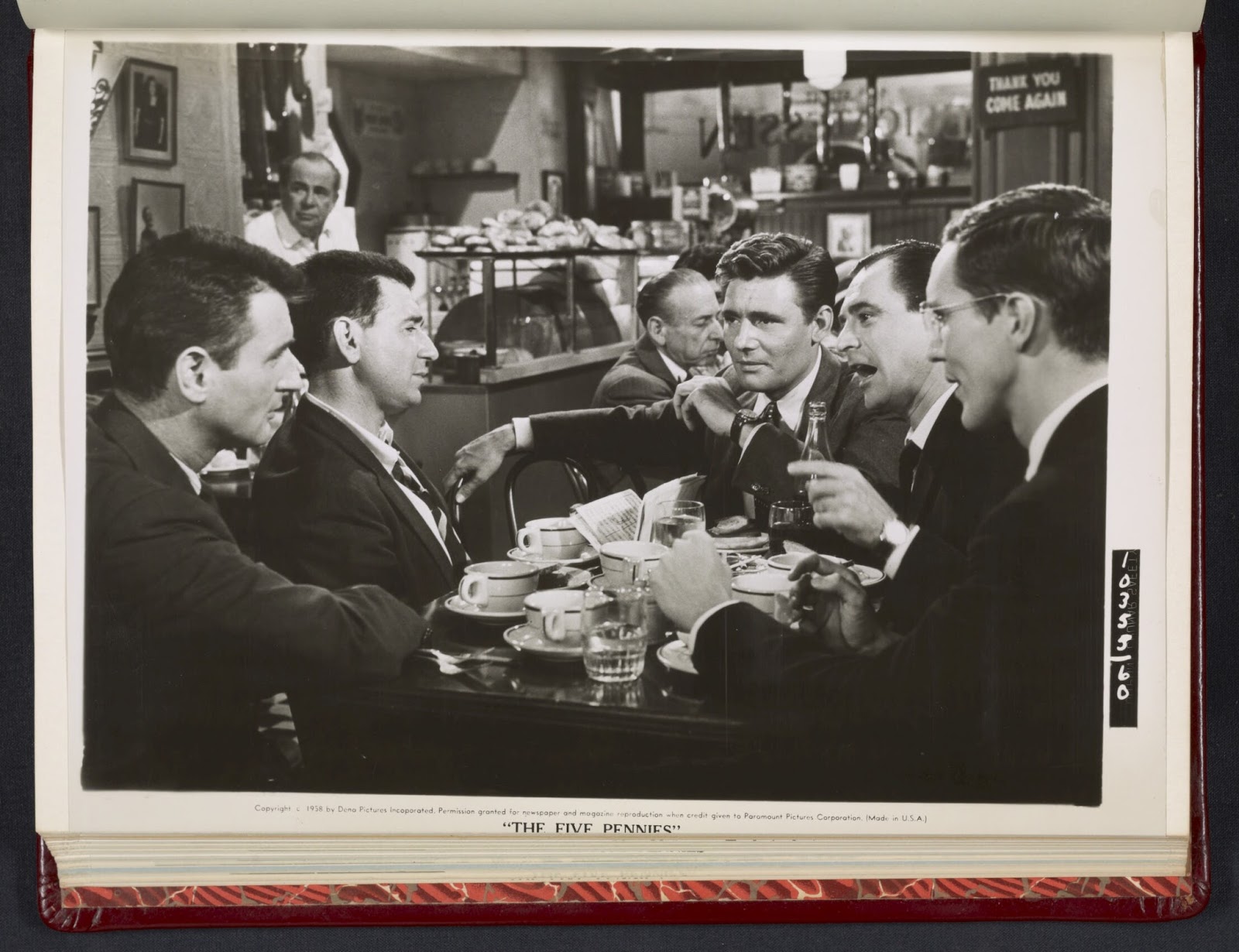Just trying to keep up
 |
| "The Five Pennies," photograph courtesy of Paramount Pictures Corporation. |
I recently had the guilty pleasure of eavesdropping on a discussion between self-published authors. They were talking about money and numbers, going over information we’ve been hearing a lot lately, including the report Hugh Howey recently released. The focus of the conversation, as usual, was about income. Before long, the tone turned negative about traditional authors who believe they’ll make more money with traditional publishing.
I started to move away—because I’m not excited about discussions that denigrate the choices of others—and then the question shifted: “Why do authors sign with traditional publishers if it’s not for the money?”
I settled back in with my coffee. Here were some of their conclusions:
 |
| "The Diversions of High Society," by Albert Levering, 1905. |
1) The goal of belonging to an elite group.
Oh my. Yes. Direct hit. I had that goal myself—right up until I started attending conferences and socializing with traditionally-published authors. I found out that the ones who excluded me would always exclude me. It wasn’t my publishing status that kept me out of that circle; it was their snobbery toward anyone who wasn’t already a member. Plenty of traditionally-published authors felt the same rub. On the other hand? I already had acceptance from traditionally-published authors who were funny and smart and inclusive.
I missed much of what the coffee club said about elite groups. I think they quoted Groucho Marx: “I don’t want to belong to any club that will accept people like me as a member.”
Their next point brought me back into full eavesdropping mode:
 |
| "The Duel," by E.W. Kemble, 1887. |
2) Competition. People traditionally publish precisely because it’s difficult to get accepted. If it’s
difficult and you succeed, it must be better. At the very least, you’re better than all the other people who try and do not succeed.
I’m not convinced this is limited to traditional publishing. Competitive people will be competitive no matter where or how they decide to publish. I do whatever I can to avoid people with this personality type because they are always sizing me up or tearing me down. They are unable to share in my joys because my happiness makes them sad for themselves. They are unable to assuage my grief because they are reveling in the fact that they have not been so stricken.
Also? Writers who live for competition rarely seem to experience happiness, even for themselves. They gloat only momentarily when they achieve a goal and then they compare themselves with someone more successful. It’s a draining and sad space to share.
So while I agreed with this coffee-mug-hugging group about people being drawn to traditional publishing for the competition, I think maybe they missed the folks who self-publish in order to prove something to those who don’t.
The next reason proposed for traditional publishing:
 |
| "What happened is droll beyond imagining," created by Elizabeth Shippen Green Elliott, 1906. |
3) Validation.
Our collective group was a little snarky on this topic, based on personal experiences with traditional publishing. Someone laughed at the idea of a snuggle fest within the shark pool. The consensus seemed to be that anyone needing validation should look for it from someone other than an agent, publisher, or reviewer on Goodreads.
My experience with agents and editors has been similar, but I think our group missed something that aligns closely with validation. When a publisher agrees your writing is worth the financial risk, when a whole team of editors and designers work on the task of producing the final product, all those people create a shield between author and reader. If things don’t go well, they all thought it was a good idea too.
Self-publishing is scary. If people read your work and bash you, it’s all on you. If they don’t like the story, it’s you. If they don’t like the typesetting, it’s you. If they don’t like the cover, it’s you. If they don’t appreciate your distribution or marketing or release dates or title, it’s all you.
I glanced up when the group disbanded and one of the members recognized me the same moment I recognized her.
I mumbled something about my proximity to their table and asked if she wasn’t traditionally-published. Pink rose to her cheeks for only a moment. “The world is changing,” she answered. “I’m just trying to keep up.”
*
This week I’m writing about the process that led me to the decision to self-publish my debut middle grade novel, Spillworthy. If you’d like a sneak peek at the cover, opportunities to win advance reading copies, or if you’d just like the inside scoop about upcoming book-release events, please request admission to the private Spillworthy Facebook group.


A lot to think about there. Some of it mirrors what I have heard or more likely read before, some new thoughts on it as well. Thanks,Johanna.
ReplyDeleteInteresting comments about elitism and competition. There does seem to be some weight in saying that you are traditionally published, but when I think about it I hadn't really focused on it being elitist mentality. I guess my gut reaction is more of what you brought up in Validation, that someone that breathes in and out words for a living believes that your story is worth putting out there. Maybe I sugar coated it more in my mind. I agree competitive people will always be competitive, often they aren't looking at the overall bigger picture, just the bigger picture for them in that moment. I really like the idea you bring up of traditional publishing providing a shield between the author and the reader. I think what will start happening is that writers will start having a blend of the two, and their work will be printed traditional and self-published.
ReplyDeleteJohn & Lara--thanks for your thoughtful replies!
ReplyDelete